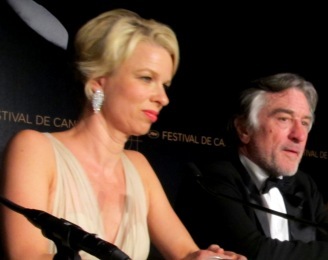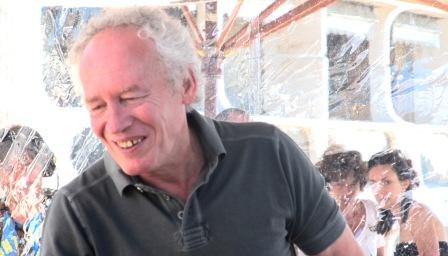Robert De Niro was his charming self at the press conference regarding the jury's decisions about Cannes this year. He grinned affably at the full room of journalists, and quipped -- in his usual near-inarticulate bumbling style -- that why did they pick x or y film to win a prize, "well most of us here thought that film was very good." The term "most of us" was repeated in most of his answers, giving rise to the suspicion that this was a year where consensus was not the norm (especially as some of the other jurors, such as Olivier Assayas, tellingly began their responses with: "Speaking for myself...")
When it came to discussing why the Dardenne film The Kid with A Bike won the Grand Prize, in tandem with Nuri Bilge Ceylan's Once Upon a Time in Anatolia, De Niro expressed a more unanimous decision:
"This was the best solution for what we all felt about the movies."
The Dardenne brothers are an institution at Cannes: they have had several films in the competition in the last fifteen years, and have won the Palme d'Or twice.
"We have a love story with Cannes," Luc Dardenne said to me earlier that week, one sunny morning on the Marriott terrace. "It is thanks to Cannes that our cinema is known, even in Belgium. Cannes makes our films sell throughout the world."
One reason the brothers are so beloved at Cannes -- and successful world-wide -- is that their films inspire good feelings: you feel the integrity, concern and ethics of the two directors. Indeed, watching one of their films is like being with a wise kindly uncle, who reassures us that somewhere someone cares -- and wants to make a difference. The typical Dardenne film features a troubled young person with nowhere to turn, who acts badly, outside of any ethical codes, and needs an adult for guidance (The Child, Rosetta, The Promise). By the end, after many rough confrontations, he or she is gently brought back into the fold of ethical behavior. The film "saves" these people.
Only the Dardennes can make such films and not risk falling into sentimentality.
The Kid With a Bike is a case in point. It is about an abandoned boy saved by a kind hairdresser. We get very involved in the boy's struggle to find a loving home, from the first shot of him running frantically, searching for his father, who does not want him. A scuffle ensues: one of many in the film for, as Luc Dardenne told me a few years ago, they love filming scuffles. (It is indeed their trademark, to have the actors physically engage with each other, rendering their combative interactions into something palpable and live.)
Emotionally, the boy is restless, lost and, above all, desperate for a parent.
The boy keeps running throughout the film: from the orphanage where he has been "placed" by his father, to the hairdresser's home (she takes him in), to a drug dealer's shack in the forest.
Jean-Pierre and Luc Dardenne are masters at creating the inner state of a confused child. The boy hits his head against a wall in frustration; he pounds himself with his fists in a car; he hides under a sheet, wrapping himself like a mummy.
"Self-violence is normal," Luc Dardenne told me when we met. He gestured eagerly and added: "Not only for children but for adults. When one can't express oneself, when one feels too violent, one turns it inward and attacks oneself."
As usual, the soundtrack of a Dardenne film is what gives it this immediate, vivacious feel: the direct sounds of car motors, dogs barking, footsteps, knocks on door. We are in the sensuous universe of the boy, with him, as he tries to find his place. We watch with suspense, wondering whether the hairdresser will tolerate his irresponsible actions.
I asked the Dardennes how they got the idea for such a heart-warming story.
"We were screening our film The Child in Japan, where the death penalty still exists, as the Japanese wanted our film to launch a debate. We encountered a magistrate who knew a kid abandoned by his father in an orphanage. And we asked ourselves: could the love of a woman help a child like this calm down, and help him become a child again, and stop him from becoming a tortured adult."
Not only does the child calm down, but the film also exudes calm, despite all its frenetic action.
"I am closer to death," Jean-Pierre said. "We have become a bit more pacific in our work. We have become pacified inside, and also in our mise-en-scene."
Jean-Pierre Dardenne greeting journalists
Luc added: "The actor who plays Cyril (Thomas Duret) helped us become calm. He was always calm, coming to the set early in the morning, smiling and ready."
This was my third time interviewing the affable and enthusiastic Dardenne brothers -- always a pleasure -- and I noted that I still had not received an answer to a question I have had for years.
Why did they care? Why did they personally have such an investment in giving expression to the painful inner lives of hurt children? Why were they -- these stand-ins for the kindly uncle -- on this crusade to help the abandoned?
Jean Pierre began: "You realize we have made many films together, my brother and I, from documentaries to fiction..."
Luc concluded: "And childhood has something to do with it. Isn't it meaningful that we find each other all the time, that every day, we wake up and see each other, and work together? This is connected to our own childhood. We have something that links us."


